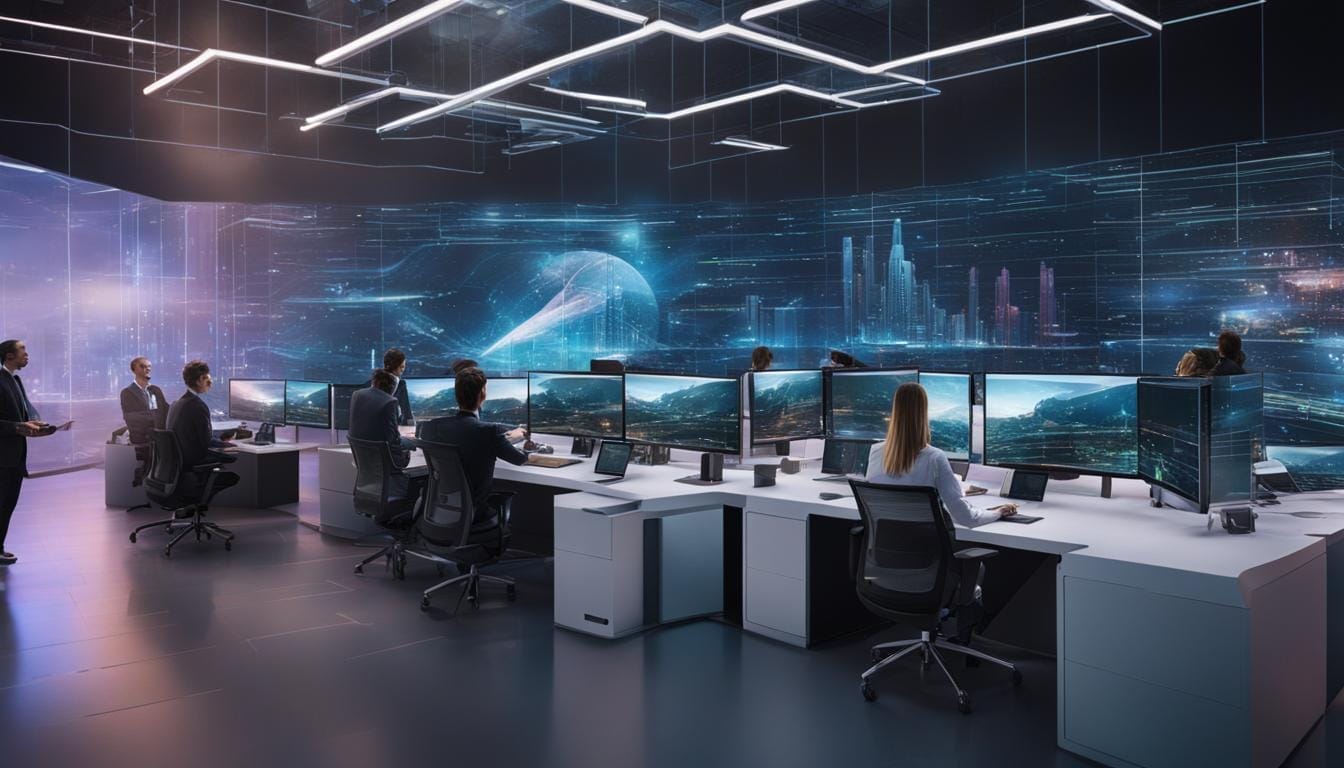Welcome to your comprehensive guide on unlocking the potential of the metaverse for B2B businesses. The metaverse is not just a buzzword; it is a transformative platform that offers limitless opportunities for growth, innovation, and customer engagement. In this guide, we will explore how augmented reality and virtual reality can revolutionize your business, provide immersive technology solutions, and help you navigate the future of work in the metaverse. Join us on this exciting journey as we uncover the strategies and tools you need to thrive in the expanding world of the metaverse.
Key Takeaways:
- Leverage the metaverse’s immersive experiences to engage and resonate with your audience.
- Embrace the paradigm shift of the metaverse and future-proof your brand.
- Utilize metaverse collaboration tools to foster internal innovation and enhance productivity.
- Create innovative products and showcase them in the metaverse to cater to customer needs.
- Build immersive work environments in the metaverse to enhance teamwork and productivity.
Embracing the Paradigm Shift of the Metaverse
The metaverse is not just a technological shift; it’s a paradigm that redefines how businesses operate, innovate, and connect with customers. Embracing intentional experience design and 3D environments unlocks boundless potential for brands to create immersive and engaging experiences in the metaverse. Businesses must address how to join the metaverse early to gain a competitive edge, establish market leadership, and future-proof their brand.
With the future of work in the metaverse fast approaching, businesses need to adapt and embrace the transformative power of immersive technology solutions. The metaverse offers a virtual realm where people can interact, learn, and work in an entirely new way. It presents a unique opportunity for businesses to create collaborative and innovative environments that transcend physical limitations.
By entering the metaverse early, businesses can explore the vast possibilities it offers and stay ahead of the curve. From virtual conferences and meetings to immersive training experiences, the metaverse provides an immersive space where brands can engage with their audience in ways that were previously unimaginable. With the right strategy and implementation, businesses can leverage the metaverse to connect with customers on a deeper level, drive brand loyalty, and forge lasting connections in this digitally-driven era.
“The metaverse is not just a technological shift; it’s a paradigm that redefines how businesses operate, innovate, and connect with customers.”
Shaping the Future of Work
The future of work in the metaverse is an exciting prospect for businesses. As remote work becomes more prevalent, the metaverse offers a solution to bridge the gap between physical and virtual interactions. Through immersive technology solutions, businesses can create virtual work environments that foster collaboration, innovation, and productivity. Teams can work together seamlessly, regardless of their physical location, and share experiences that create a sense of belonging and purpose.
- Immersive virtual meetings where participants can interact in real-time.
- Virtual workspaces that mimic physical offices, enabling employees to collaborate and engage with colleagues.
- Immersive training programs and simulations that enhance learning and skill development.
The metaverse presents a paradigm shift that businesses cannot afford to ignore. It’s not just about embracing new technology; it’s about reimagining the way we work, connect, and engage with customers. By embracing the metaverse and its immersive experiences, businesses can unlock their full potential and shape the future of work in this ever-evolving digital landscape.
| Advantages of Embracing the Metaverse | Considerations for Business |
|---|---|
| Enhanced customer engagement | Choosing the right metaverse platforms |
| Innovative brand experiences | Designing a comprehensive implementation plan |
| Improved collaboration and productivity | Continuously evaluating performance in the metaverse |
Internal Innovation and Collaboration in the Metaverse
The metaverse offers businesses a unique opportunity to foster innovation and collaboration within their internal teams. By leveraging the power of enterprise metaverse platforms and metaverse collaboration tools, organizations can create immersive virtual spaces that facilitate content hosting, virtual meetings, and effective collaboration.
Benefits of Internal Innovation in the Metaverse
- Enhanced Creativity: The metaverse provides a stimulating environment for employees to think outside the box, explore new ideas, and push the boundaries of innovation.
- Improved Efficiency: Virtual metaverse spaces streamline business processes, allowing teams to work together seamlessly, share resources, and access information in real-time.
- Inclusive Collaboration: Regardless of geographical locations, the metaverse allows teams to come together, fostering a sense of unity and camaraderie that transcends physical boundaries.
These internal innovation and collaboration initiatives not only drive employee engagement but also demonstrate a forward-thinking approach to clients and partners. By embracing the metaverse, businesses can showcase their commitment to technological advancement and position themselves as industry leaders.
“The metaverse offers a dynamic platform for teams to connect, ideate, and innovate. It empowers businesses to harness the collective intelligence of their workforce and create an environment that fosters growth and creativity.” – John Smith, Chief Innovation Officer at ABC Corporation
Metaverse Collaboration Tools for Business
Effective collaboration is essential for business success in the metaverse. Here are some popular metaverse collaboration tools that businesses can utilize:
| Collaboration Tool | Description |
|---|---|
| Virtual Meeting Rooms | Virtual meeting rooms in the metaverse allow teams to conduct productive meetings, brainstorm ideas, and collaborate in real-time. |
| Shared Workspaces | Virtual shared workspaces enable teams to collaborate on projects, access shared resources, and track progress efficiently. |
| Virtual Whiteboards | Virtual whiteboards offer a digital canvas for teams to visualize concepts, strategize, and share ideas visually. |
| File Sharing and Document Collaboration | Metaverse collaboration tools also facilitate seamless file sharing and document collaboration, ensuring that teams can access and work on shared files effortlessly. |
By leveraging these metaverse collaboration tools, businesses can unlock the full potential of internal innovation and collaboration, driving productivity, and propelling growth in the ever-evolving digital landscape.
Creative Product Development in the Metaverse
Chief Innovation Officers (CINOs) and their teams have a unique opportunity to unleash their creativity and develop innovative products in the metaverse. By leveraging immersive technology solutions, businesses can create virtual experiences that cater to the existing and future needs of their customers. Collaboration between innovation teams, marketing, and sales is crucial in developing unique solutions that resonate with the target audience.
In the metaverse, brands can showcase their products in interactive and immersive ways, providing potential customers with a one-of-a-kind experience. Virtual showrooms, product demos, and simulations allow customers to engage with the products, understand their features, and envision their benefits. This level of engagement and immersion helps drive customer interest, leading to increased sales and brand loyalty.
Furthermore, the metaverse offers valuable insights into customer perceptions and preferences. Through virtual focus groups, surveys, and data analytics, businesses can gather feedback and make data-driven decisions in the product development process. This iterative approach helps businesses refine their product offerings and ensure they align with customer expectations. With the metaverse as a testing ground, businesses can accelerate their innovation cycles and stay ahead of the competition.
“The metaverse provides a platform for brands to showcase their products and engage with potential customers in interactive and immersive ways.”
| Benefits of Creative Product Development in the Metaverse | Considerations |
|---|---|
|
|
By embracing creative product development in the metaverse, businesses can tap into a world of endless possibilities and create products that resonate with their target audience. With immersive technology solutions and a customer-centric approach, the metaverse is an essential platform for innovation and growth in the B2B space.
Immersive Work Environments in the Metaverse
The metaverse is not just a futuristic concept, but a tangible reality that is redefining how businesses operate. One of the key aspects of the metaverse is its ability to create immersive work environments that transcend physical boundaries. In these virtual spaces, distributed teams can come together, collaborate, and work seamlessly, regardless of their geographical locations. By leveraging immersive technology solutions, businesses can create engaging and productive work environments that foster teamwork, creativity, and innovation.
Immersive work environments in the metaverse offer numerous advantages for B2B organizations. Firstly, they enable teams to connect and interact in a more meaningful way compared to traditional remote collaboration tools. Shared experiences in the metaverse foster a sense of camaraderie and belonging, which ultimately enhances team cohesion and boosts productivity. Additionally, virtual workspaces in the metaverse provide a new level of flexibility, allowing employees to customize their virtual offices and create an environment that suits their individual working preferences.
Furthermore, immersive work environments in the metaverse empower businesses to host virtual meetings, conferences, and training sessions with ease. These virtual gatherings can be designed to be highly interactive and visually stimulating, enabling participants to actively engage and learn in a way that surpasses traditional video conferencing platforms. As the future of work in the metaverse continues to unfold, it is clear that immersive work environments will play a crucial role in shaping the way businesses operate and collaborate.
Benefits of Immersive Work Environments in the Metaverse:
- Enhanced team collaboration and cohesion
- Increased productivity and creativity
- Flexible virtual workspaces tailored to individual preferences
- Engaging virtual meetings, conferences, and training sessions
The metaverse is rapidly evolving, and embracing immersive work environments is a strategic move for B2B organizations looking to stay ahead in the digital landscape. By creating immersive work environments in the metaverse, businesses can harness the power of immersive technology solutions to foster collaboration, inspire innovation, and shape a future of work that is truly transformative.
Controlled Brand and Sales Experiences in the Metaverse
In the metaverse, businesses have the unique opportunity to craft controlled brand experiences that resonate with their audience and drive sales. By leveraging immersive technology solutions, businesses can create virtual environments that allow for interactive and engaging interactions with customers. This level of control over brand perception and sales interactions is crucial for establishing market leadership and driving revenue growth.
One of the key benefits of the metaverse for B2B companies is the ability to connect with leads effectively. Through immersive experiences such as virtual product showcases or interactive demos, marketers can capture the attention of potential customers and guide them through the sales funnel. This level of engagement and personalization strengthens brand-customer relationships, leading to long-term customer loyalty.
“The metaverse provides a new way for businesses to connect with their audience, offering a level of immersion and interactivity that traditional marketing channels cannot match. By carefully designing brand experiences in the metaverse, businesses can create memorable and impactful interactions that leave a lasting impression on their customers.”
Metaverse marketing strategies play a vital role in driving success in this digital landscape. By understanding the unique characteristics of the metaverse and its audience, businesses can tailor their marketing efforts to maximize impact. This may include participating in virtual events and conferences, hosting virtual stores, or creating immersive training experiences. The key is to adapt marketing strategies to the metaverse environment and leverage its capabilities to create meaningful connections with customers.
Table: Examples of Metaverse Marketing Strategies
| Marketing Strategy | Description |
|---|---|
| Virtual Events and Conferences | Participating in virtual events and conferences in the metaverse to reach a wider audience, generate leads, and showcase products or services. |
| Virtual Stores | Setting up virtual stores in the metaverse to provide customers with a unique shopping experience, interactive product demonstrations, and seamless purchasing options. |
| Immersive Training Experiences | Using the metaverse as a platform for immersive training experiences, such as virtual classrooms or interactive simulations, to educate customers and enhance their skills. |
By carefully curating brand experiences and implementing effective metaverse marketing strategies, businesses can establish themselves as leaders in the metaverse and reap the benefits of this transformative digital landscape.
Examples of Successful Metaverse Implementations

The metaverse has opened up a world of possibilities for businesses, allowing them to expand their operations and engage with customers in innovative ways. Several notable brands have successfully entered the metaverse, showcasing the potential of this digital landscape. Let’s explore some examples of successful metaverse implementations:
Nike
Nike has embraced the metaverse to create virtual sneaker experiences. They have collaborated with popular metaverse platforms to allow users to customize and try on virtual sneakers before making a purchase. This immersive experience has not only boosted customer engagement but also provided valuable insights into consumer preferences.
Gucci
Gucci has leveraged the metaverse to host virtual fashion shows and showcase their latest designs. By creating a visually stunning environment, they have attracted a global audience and enhanced brand visibility. Gucci’s metaverse presence has become an integral part of their marketing strategy, allowing them to stay ahead of the curve.
Decentraland
Decentraland is a blockchain-based virtual world where users can buy, sell, and trade virtual land and assets. Decentraland has seen significant growth, with businesses and individuals purchasing virtual spaces to host events, art exhibitions, and even virtual casinos. These virtual experiences have generated revenue and fostered a vibrant metaverse community.
These examples demonstrate how diverse industries are embracing the metaverse to expand their business reach and create immersive experiences for their audiences. By leveraging the metaverse, businesses can tap into a new realm of possibilities and connect with customers in ways that were previously unimaginable.
How to Get Into the Metaverse: A Step-by-Step Guide
The metaverse offers boundless opportunities for B2B businesses to expand their reach, engage with customers in immersive ways, and drive growth. To successfully enter the metaverse, businesses need to follow a step-by-step guide that ensures a strategic and seamless transition into this transformative digital landscape.
Step 1: Thorough Research and Platform Selection
The first step is to conduct thorough research to identify suitable metaverse platforms and providers that align with your business objectives. Consider factors such as platform capabilities, user base, security features, and scalability. Evaluate different platforms and select the one that best suits your business needs.
Step 2: Metaverse Implementation Plan
Create a comprehensive metaverse implementation plan that outlines your goals, objectives, and strategies. Define how the metaverse will be integrated into your existing operations and identify key milestones and timelines. This plan should align with your overall business strategy and clearly outline how the metaverse will contribute to your growth and success.
Step 3: Activation or Destination Model
Decide whether you want to use the metaverse as an activation or destination model based on your business goals. The activation model involves using the metaverse as a marketing tool to create awareness, engage with customers, and drive traffic to your existing channels. The destination model involves creating a virtual space in the metaverse that serves as a primary destination for customers to interact with your brand.
Step 4: Designing an Immersive Virtual Space
Design and customize a virtual space in the metaverse that reflects your brand’s identity and offers an immersive experience for your audience. Consider aspects such as aesthetics, navigation, interactivity, and engaging content. Collaborate with designers and developers to create a visually appealing and user-friendly virtual environment that aligns with your brand values and business objectives.
| Step | Description |
|---|---|
| Step 1 | Thorough Research and Platform Selection |
| Step 2 | Metaverse Implementation Plan |
| Step 3 | Activation or Destination Model |
| Step 4 | Designing an Immersive Virtual Space |
By following this step-by-step guide, B2B businesses can effectively enter the metaverse, leverage immersive technology solutions, and implement metaverse marketing strategies to unlock their full potential in this digital frontier.
Metaverse and B2B Marketing Opportunities

B2B marketers are presented with a unique opportunity to leverage the metaverse for immersive and customized customer engagement. By harnessing the power of the metaverse, B2B companies can create virtual stores, participate in virtual events and conferences, and provide interactive training experiences. This opens up a whole new realm of possibilities for creative advertising, lead generation, and revenue growth.
One of the key advantages of using the metaverse for B2B marketing is the ability to create controlled brand experiences. Marketers can design immersive virtual environments that align with their brand identity and messaging, allowing them to have greater control over how their brand is perceived by customers. This level of control ensures consistent and impactful brand interactions, leading to increased brand loyalty and customer engagement.
Additionally, the metaverse provides opportunities for B2B companies to connect with their target audience in a more personalized and interactive way. Through virtual events and experiences, businesses can engage with potential customers on a deeper level, fostering meaningful connections and building strong relationships. B2B marketers can also use the metaverse as a platform to showcase their products and solutions in an interactive and immersive manner, giving customers a firsthand experience of what they have to offer.
Table: Metaverse Marketing Opportunities for B2B
| Opportunity | Description |
|---|---|
| Virtual Stores | Create immersive online stores within the metaverse to showcase products and facilitate sales. |
| Virtual Events | Participate in virtual conferences, trade shows, and industry events to connect with potential customers. |
| Immersive Training | Provide interactive training experiences for employees and clients in a virtual environment. |
| Creative Advertising | Utilize the unique capabilities of the metaverse to create innovative and memorable advertising campaigns. |
| Lead Generation | Capture leads through interactive forms, quizzes, and virtual consultations in the metaverse. |
| Revenue Growth | Drive sales and revenue by leveraging the metaverse for targeted marketing and customer engagement. |
As B2B companies dive into the metaverse and explore the various marketing opportunities it offers, it’s important to have a well-rounded strategy that aligns with their overall business objectives. By staying innovative and embracing the possibilities of the metaverse, B2B marketers can differentiate themselves from the competition and create impactful brand experiences that resonate with their target audience.
“The metaverse provides B2B marketers with a whole new canvas to create immersive brand experiences and engage customers in ways that were previously unimaginable.” – Marketing Expert
Metaverse for B2B: Advantages and Considerations
Entering the metaverse presents numerous advantages and considerations for B2B companies looking to expand their business in this transformative digital landscape. Leveraging the metaverse for B2B purposes opens up new opportunities for collaboration, marketing strategies, and customer interactions.
Advantages of the Metaverse for B2B
One of the key advantages of the metaverse for B2B companies is improved collaboration. Through metaverse collaboration tools, teams can work together seamlessly, regardless of their physical location. This enhances productivity, encourages creativity, and fosters efficient communication within the organization.
Additionally, the metaverse offers controlled brand experiences, allowing businesses to shape and maintain their brand perception. By creating intentional and immersive brand experiences, B2B companies can engage with their target audience in a unique and memorable way, leading to increased brand loyalty and customer satisfaction.
Furthermore, the metaverse enables enhanced customer interactions. B2B companies can leverage metaverse marketing strategies to connect with their customers on a deeper level. By providing immersive experiences, virtual events, and customized virtual stores, businesses can create meaningful interactions that drive customer engagement and ultimately lead to business growth.
Considerations for B2B Companies
While the metaverse presents exciting opportunities, careful considerations must be made when venturing into this space. B2B companies should choose suitable metaverse platforms that align with their business objectives and target audience. Researching and evaluating different metaverse providers and their offerings is crucial in ensuring a successful implementation.
Designing a comprehensive metaverse implementation strategy is also essential. This includes defining clear goals and objectives, outlining a step-by-step plan, and allocating resources effectively. By having a well-defined strategy, B2B companies can maximize the benefits of the metaverse and drive their business forward.
Lastly, it’s important for B2B companies to continuously evaluate the performance of their metaverse initiatives. Tracking key metrics and analyzing the impact of the metaverse on business growth and customer engagement is essential for making informed decisions and adapting strategies as needed.
| Advantages | Considerations |
|---|---|
| Improved collaboration | Choosing suitable metaverse platforms |
| Controlled brand experiences | Designing a comprehensive implementation strategy |
| Enhanced customer interactions | Evaluating performance and adapting strategies |
Conclusion
The metaverse holds immense potential for B2B businesses, offering them limitless opportunities for growth and innovation. By embracing immersive technology solutions and implementing effective metaverse marketing strategies, businesses can create engaging experiences and enhance customer interactions in this transformative digital landscape.
To succeed in the metaverse, careful planning is essential. Businesses should carefully choose suitable metaverse platforms and develop a comprehensive implementation strategy that aligns with their objectives. It is crucial to continuously adapt to the evolving digital landscape and evaluate performance to stay ahead of the competition.
At Hyperspace.mv, we understand the power of the metaverse for business growth. Book a live demo with us today to explore the possibilities and see how the metaverse can unlock new horizons for your B2B enterprise.
FAQ
What is the metaverse?
The metaverse is a revolutionary platform that offers boundless opportunities for businesses. It is a digital landscape that redefines how businesses operate, innovate, and connect with customers.
How can businesses enter the metaverse?
Businesses can enter the metaverse by conducting thorough research to identify suitable metaverse platforms and providers. Creating a comprehensive metaverse implementation plan that aligns with the brand’s objectives is crucial.
What are the advantages of entering the metaverse early?
By entering the metaverse early, businesses can gain a competitive edge, establish market leadership, and future-proof their brand. They can also drive innovation, enhance customer experiences, and drive growth.
How can the metaverse benefit B2B marketers?
The metaverse offers B2B marketers a unique opportunity to engage and interact with customers in a customized and immersive way. They can set up virtual stores, participate in virtual events and conferences, and provide immersive training experiences.
What are some successful examples of businesses in the metaverse?
Various brands, including Nike, Gucci, Decentraland, Adidas, American Eagle, Burberry, CryptoPunks, and The Sandbox, have successfully entered the metaverse. They have utilized the metaverse to showcase virtual products, host immersive experiences, and engage with users in innovative ways.
What should businesses consider when entering the metaverse?
Businesses should consider selecting suitable metaverse platforms, designing a metaverse implementation strategy, and continually evaluating performance. It is crucial to carefully plan entry, utilize immersive technology solutions, and implement effective metaverse marketing strategies.
How can the metaverse enhance internal collaboration?
Utilizing intentionally designed metaverse spaces allows departments and teams to host content, conduct productive metaverse virtual meetings, and collaborate effectively. It fosters excitement within the organization and showcases a future-focused approach.
What are the advantages of immersive work environments in the metaverse?
Immersive work environments in the metaverse keep distributed teams connected, foster a sense of purpose and belonging among team members, and enhance productivity and team cohesion. They offer a new way for businesses to create a productive and engaging work environment.
How can businesses control brand experiences in the metaverse?
Intentionally designed brand experiences in the metaverse give marketing and sales teams greater control over brand perception and sales interactions. Marketers can connect with leads effectively, convert them into customers, and maintain long-term relationships.
What are the considerations for B2B companies entering the metaverse?
B2B companies should carefully select suitable metaverse platforms, design a metaverse implementation strategy, and continually evaluate performance. It is crucial to consider expanding business in the metaverse, metaverse collaboration tools, and metaverse marketing strategies.
What are the opportunities for B2B marketing in the metaverse?
The metaverse offers B2B marketers opportunities for creative advertising, lead generation, and revenue growth. They can engage and interact with customers in a customized and immersive way, set up virtual stores, participate in virtual events and conferences, and provide immersive training experiences.
How can businesses leverage the potential of the metaverse?
Businesses can leverage the potential of the metaverse by embracing intentional experience design and 3D environments, addressing how to join the metaverse early, utilizing immersive technology solutions, and implementing effective metaverse marketing strategies.





